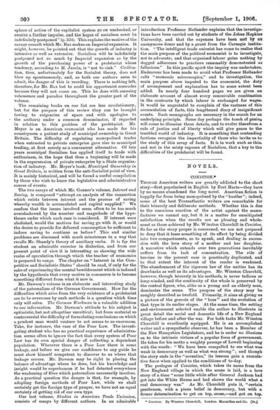NOVELS.
CONISTON.*
THOUGH American writers are greatly addicted to the short story—first popularised in English by Bret Harts—they have by no means abandoned the long novel. American fiction is happily far from being monopolised by the "hustler"; indeed, some of the best Transatlantic writers are remarkable for their leisurely and deliberate methods. Whether this is due to the conscious reaction of the artist against the manu- facturer we cannot say, but it is a matter for unmitigated satisfaction when the results are as pleasing and whole- some as those achieved by Mr. Winston Churchill in Coniston. So far as the story proper is concerned, we are not prepared to deny that it loses something of its effect by being divided into two compartments, so to speak, and dealing in succes- sion with the love story of a mother and her daughter. A narrative which extends over two generations inevitably suffers from its lack of concentration. The role of heroine in the present case is practically duplieated, and to that extent the interest of the reader is weakened. The abandonment of the rigorous law of the unities has its drawbacks as well as its advantages. Mr. Winston Churchill, however, though leisurely in his methods, is never tedious or long-winded, and the continuity of the whole is preserved by the central figure, who, alike as a young and an elderly man, dominates the scene. The purpose of the story may be roughly described as twofold. Primarily, it aims at giving us a picture of the genesis of the "boss" and the evolution of that type in its earlier stages. At the same time, the setting and environment selected enable the author to illustrate in great detail the social and domestic life of a New England village before and after the war. For both tasks Mr. Winston Churchill is excellently equipped. He is an accomplished writer and a sympathetic observer, be has been a Member of the New Hampshire Legislature, and he is under no illusions as to the intrinsic virtues of a popular form of government. He takes for his motto a weighty passage of Lowell beginning with the words; "We have been compelled to see what was weak in democracy as well as what was strong "; and though the story ends in the "seventies," its lessons gain a cumula- tive force when applied to the conditions of to-day.
The prologue of Coniston, which takes its name from the New England village in which the scene is laid, is a love story of a time "some little while after General Jackson had got into the White House and had shown the world what a real democracy was." As Mr. Churchill puts it, "certain gentlemen, with a pious belief in democracy, but with a firmer determination to get on top, arose,—and got on top.
• Coniston. By Winston Churchill. London: Macmillan and Co. [6s.J So many of these gentlemen arose in the different States, and they were so clever, and they found so many chinks in the Constitution to crawl through and steal the people's chest- nuts, that the Era may be called the Boss-Era." The par- ticular "boss," however, who dominates these pages is a much more primitive and engaging character than the "bosses " of a later generation. Jethro Bass, the tanner's son, whose father had amassed a small competence by dealing in mort- gages, a business which he himself considerably extended, is very far from being a Transatlantic reincarnation of Cleon the tanner. He is no glib-tongued demagogue, but a silent, half-articulate rustic, who owes his success in the handling of men to his tenacity and to a strange clairvoyance, an unerring divination of motive which enables him in every encounter to go straight to the root of the matter with the least expenditure of words. Alike in his uncouth exterior, his resort to humorous apologue, and his moments of dreamy self-absorption, Jethro suggests a Lincoln manque. He never aspires to official rank, preferring the substance to the trappings of power, and, beginning by mastering the village, ends by controlling a State Legislature. Yet he is by no means a vicious tyrant. In many ways be makes for efficiency, he takes a humorous pleasure in foiling the schemes of his greedier rivals, he has a curious tender-beartedness for the weak, and a respect for the incorruptible. As a young man he falli deeply in love with Cynthia Ware, the minister's daughter, and, mastered by his sincerity, she more than half returns his love. But obstacles intervene, and they drift apart. Cynthia "teaches school," marries a gentle, con- sumptive shop-assistant, and dies young, leaving an only child, another Cynthia, whom Jethro ultimately adopts on her father's death. It is in the strange contrast between Jethro's pure devotion to Cynthia Wetherell and his record as a politician that the dramatic interest of the story resides. Cynthia only gradually, awakens to the consciousness that the man whom she reverences is held in awe and abhorrence by almost every one else. At first she is incredulous, but in time finds that her own reputation and prospects in life are likely- to be blighted by her association with her benefactor. Her lover is the son of Jethro's bitterest political enemy, and incurs his father's grave displeasure for his constancy to the playmate of his childhood. Of the device by which Mr. Winston Churchill extricates the leading characters from this impasse we need say no more than that it brings to a very satisfactory close a story in which sentiment and politics are very ingeniously combined. The canvas is perhaps rather overcrowded with portraits, but there are very few that we could wish away ; and by the time the end is reached many of them have established so strong a hold on the affections of the reader that we part from them with real regret.



































 Previous page
Previous page